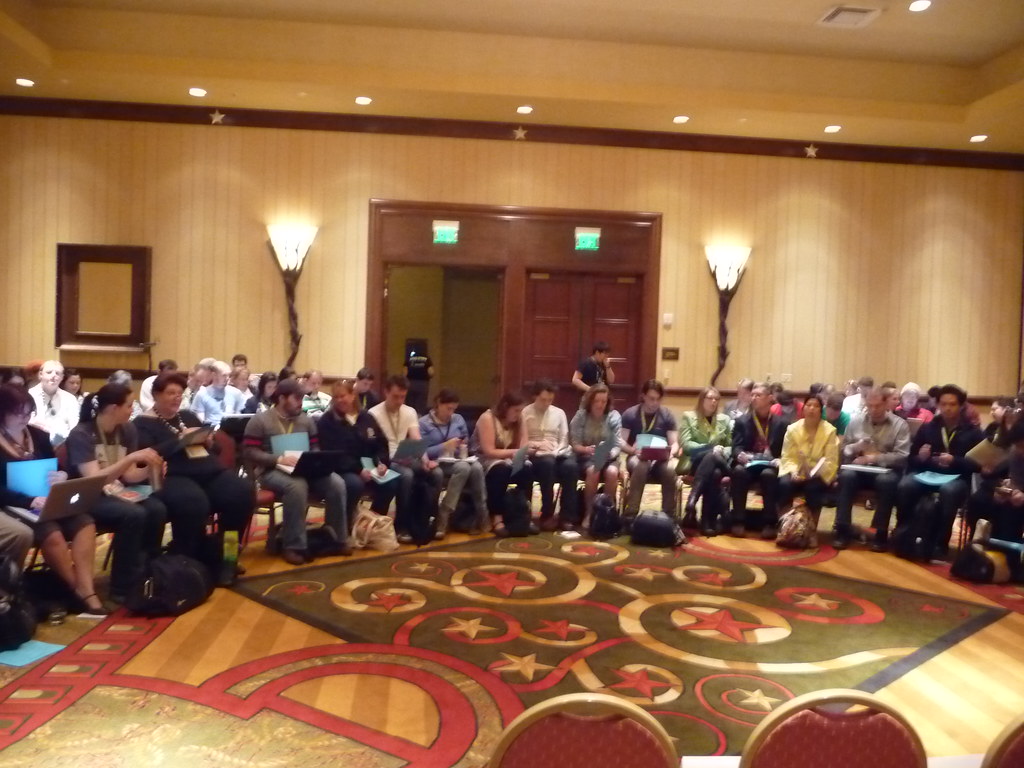Over the years, I’ve found myself mulling the differences between fandoms organized around narrative and those organized around music. It’s now a topic on which I have to pull together my thoughts in 1000 words or less for Henry Jenkins et al’s book on spreadable media. This post is really just me thinking outloud in a rough stab at a start. I would LOVE your feedback on the distinctions I’m drawing and those I’ve missed.
Narratives have characters, plots, and holes to be filled by fan creativity. Music doesn’t. Sure, you can get into discussions of lyrics, and there are many fan lyric interpretation sites out there, and heaven knows you can obsess on the musicians, but for all the time I’ve spent in music fandom, lyric interpretation has never seemed all that important to the social life around music. Music fans interpret what’s best and what’s worst in an artists’ catalogue, and they review shows, but it’s just a whole lot harder to talk about the significance of that chord change or the way that bridge takes the song into the third verse than it is to talk about what that shot of the window at the end of the scene was meant to imply or what a character meant when she said what she said.
Narrative also leaves space for much more fan creativity. Music fans may make their own videos to accompany songs, or form cover bands, or write fan fiction about musicians, but with the important exception of remixes, which remain a fairly marginal fan practice, I’ve never seen fans write songs in the same way that fans of a TV show will write stories using the characters. Music fans don’t seek to complete the music through interpretation and creativity. The music arrives complete. Fans can’t fix it or rebuild it in the same way they can with stories.
Music fans are far more likely to focus on news and information. Narrative fans certainly do this, building timelines and keeping abreast of production, casting, and so on, but music fans seem to do this as their primary activity. It’s all about when the album will be released, what the setlist will be, when the tour will happen, and what songs were played what night in what order. This is why music fan communities on the internet tend to get very quiet when the most recent album has been out for a while and the band isn’t touring. What’s to discuss?
Music fans also share the very objects of their fandom by making mix tapes, playlists, writing mp3 blogs, and sending one another recordings and bootlegs. On occassion, narrative fans will share a recording of a missed show with another fan, but, like lyrical interpretation in music fandom, this seems like a marginal practice in narrative fandom.
But I’m thinking that perhaps the most important distinction between the two fandoms is the way that music fans take the resources of their fandom outside of that fandom as part of their self-presentation in other contexts. Think t-shirts with band names (Rob Walker’s excellent book Buying In reports that Ramones t-shirts have outsold Ramones albums 10 to 1). Think playlists embedded on social network profiles. Think bumper stickers (I think “Republicans for Voldemort” is the only narrative fandom bumper sticker I’ve ever seen, though I’ve seen hundreds of stickers naming bands). When I used to work in a record store and grandmothers would come in at Christmas time to buy a gift for the grandkid and ask “what are all the kids listening to these days?” we’d respond “what kind of haircut does your grandchild have?” How does a Lost fan dress? Can you spot a Star Wars fan walking down the street? Narrative fandom is invisible unless it’s being discussed. Music fandom is much more likely to be made visible as an intrinsic part of self-definition in a wide variety of situations.
The upshot is that we should be wary of taking the practices of narrative fandom on which most fandom theory has been built as exemplary of all fandom. Different kinds of materials call for different kinds of practices, and if we’re to build theories that encompass all of fandom, we need to account for these distinctions as well as the similarities.





